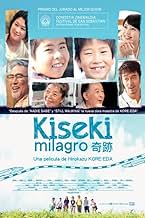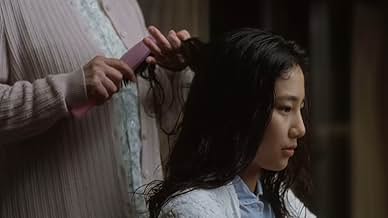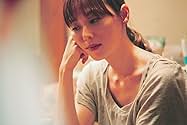AVALIAÇÃO DA IMDb
7,3/10
8,3 mil
SUA AVALIAÇÃO
Adicionar um enredo no seu idiomaTwelve-year-old Koichi, who has been separated from his brother Ryunosuke due to his parents' divorce, hears a rumor that the new bullet trains will precipitate a wish-granting miracle when ... Ler tudoTwelve-year-old Koichi, who has been separated from his brother Ryunosuke due to his parents' divorce, hears a rumor that the new bullet trains will precipitate a wish-granting miracle when they pass each other at top speed.Twelve-year-old Koichi, who has been separated from his brother Ryunosuke due to his parents' divorce, hears a rumor that the new bullet trains will precipitate a wish-granting miracle when they pass each other at top speed.
- Prêmios
- 5 vitórias e 9 indicações no total
Kôki Maeda
- Koichi
- (as Koki Maeda)
Ôshirô Maeda
- Ryunosuke
- (as Oshiro Maeda)
Nene Ôtsuka
- Nozomi (Mother)
- (as Nene Ohtsuka)
Avaliações em destaque
Pre-teen brothers Ryunosuke and Koichi (played by real-life brothers Ohshirô and Koki Maeda) are forced to live apart when their separated parents end up residing in opposite ends of Kyushu. Ryunosuke broods on this, while Koichi seems more at ease with the arrangements. Together, the brothers hatch a plan to meet at the point where the new shinkansen trains pass each other, after hearing an urban legend that the vortex created by the speed of the trains has the power to grant wishes. Meanwhile, granddad tries out a new sponge cake recipe, a friend of Koichi's has acting ambitions, and Dad is writing a new song.
The usual Kore-eda themes of fractured families and kids finding magic in a flawed universe are present, but by the director's own standards this is a much lighter, almost sugar-coated engagement with those themes. There is the signature naturalistic, engrossing performances from the child actors, with Ohshirô as Ryunosuke especially impressive in his conflicted, caring attempts to be re-united with his brother. Koki is more of a one-note outing, required to be relentlessly upbeat, which he does superbly. The scene where he moves his mother to tears on the phone plays on this astutely. Forcing two young brothers to live apart for their own selfish ends could be represented in darker tones, even as abuse, but Kore-eda keeps it all light and humorous, through the simple trope of having the children be sensible and down-to-earth, and the adults, especially the bickering parents, petty and immature. The sub-plots, involving sponge cake and acting ambitions, are so removed from the main story strand that they give the film an episodic, slightly meandering feel when they pop up. Ultimately they are distracting, making the story busier than it needs to be. They also stretch the running time to over two hours. While some will delight in spending time with such engaging children, the film felt flabby to me after the 90-minute mark. The ending, while admirably avoiding sentimentality, takes too long to come around.
Such is Kore-eda's stature that a host of A-listers pack the minor roles giving them more gravitas than normal. Jô Odagiri as the musician father, Kirin Kiki as the grandmother, and Hiroshi Abe as a disciplinarian teacher ply their day-shifts admirably.
There is a lot to enjoy in I Wish, but lacking the damning social critique of Nobody Knows, and the acerbic scalpel on family life of Still Walking, this is Kore-eda choosing to crowd please rather than stretch himself.
The usual Kore-eda themes of fractured families and kids finding magic in a flawed universe are present, but by the director's own standards this is a much lighter, almost sugar-coated engagement with those themes. There is the signature naturalistic, engrossing performances from the child actors, with Ohshirô as Ryunosuke especially impressive in his conflicted, caring attempts to be re-united with his brother. Koki is more of a one-note outing, required to be relentlessly upbeat, which he does superbly. The scene where he moves his mother to tears on the phone plays on this astutely. Forcing two young brothers to live apart for their own selfish ends could be represented in darker tones, even as abuse, but Kore-eda keeps it all light and humorous, through the simple trope of having the children be sensible and down-to-earth, and the adults, especially the bickering parents, petty and immature. The sub-plots, involving sponge cake and acting ambitions, are so removed from the main story strand that they give the film an episodic, slightly meandering feel when they pop up. Ultimately they are distracting, making the story busier than it needs to be. They also stretch the running time to over two hours. While some will delight in spending time with such engaging children, the film felt flabby to me after the 90-minute mark. The ending, while admirably avoiding sentimentality, takes too long to come around.
Such is Kore-eda's stature that a host of A-listers pack the minor roles giving them more gravitas than normal. Jô Odagiri as the musician father, Kirin Kiki as the grandmother, and Hiroshi Abe as a disciplinarian teacher ply their day-shifts admirably.
There is a lot to enjoy in I Wish, but lacking the damning social critique of Nobody Knows, and the acerbic scalpel on family life of Still Walking, this is Kore-eda choosing to crowd please rather than stretch himself.
Lighthearted but profound Japanese family drama about two young brothers forced to live apart after the separation of their parents. The more sensitive Koichi (Koki Maeda) lives with his mother and grandparents in Kagoshima under the shadow of the active Sakurajima volcano, while the happy-go-lucky Ryu (Ohshirô Maeda) has remained in Fukuoka with their slacker musician father. Koichi longs for them to be reunited and when he hears of a magical rumour that when two super-fast Bullet trains pass each other they create enough cosmic energy to grant your wish, he and his friends set out to put things back the way they were.
The suburban tale of a troubled family told with a touch of fantasy and adventure draws obvious parallels with Spielberg, and it is more than worthy of the comparison. Director Hirokazu Koreeda elicits two incredibly natural performances from the boys (real life brothers) and indeed all of the young cast – in the scenes where they're hanging out he has seemingly turned the camera on some local school friends, their relationships seem so genuine. Koichi and Ryu's story is interspersed with those of their friends and family, all of whom have their own struggles and aspirations. Be it their grandfather's desire to bake a successful sponge cake, or Koichi's friend's dream of marrying the beautiful school librarian, every character – no matter how minor – is portrayed as a real person with their own hopes and fears. As a result it is constantly engrossing, establishing an affinity with everyone on screen and also allowing some fantastically warm funny moments to emerge from the characters themselves. Despite its concentration on character over narrative, and its general unpredictability, the film still has a mainstream tone and is more than capable of cultivating a wide, varied audience.
A quiet natural film that avoids obvious melodrama and sentimentality, it retains a thoughtful depth about what it is to dream and hope for that which is just out of reach. As is often the case with the most affecting cinema its power lies in what the viewer brings to it from their own lives, and how much they are willing to invest in the film. With no obvious moral or message, it has the potential to be interpreted in many ways. A philosophical yet thoroughly accessible film that effortlessly gets under the skin.
The suburban tale of a troubled family told with a touch of fantasy and adventure draws obvious parallels with Spielberg, and it is more than worthy of the comparison. Director Hirokazu Koreeda elicits two incredibly natural performances from the boys (real life brothers) and indeed all of the young cast – in the scenes where they're hanging out he has seemingly turned the camera on some local school friends, their relationships seem so genuine. Koichi and Ryu's story is interspersed with those of their friends and family, all of whom have their own struggles and aspirations. Be it their grandfather's desire to bake a successful sponge cake, or Koichi's friend's dream of marrying the beautiful school librarian, every character – no matter how minor – is portrayed as a real person with their own hopes and fears. As a result it is constantly engrossing, establishing an affinity with everyone on screen and also allowing some fantastically warm funny moments to emerge from the characters themselves. Despite its concentration on character over narrative, and its general unpredictability, the film still has a mainstream tone and is more than capable of cultivating a wide, varied audience.
A quiet natural film that avoids obvious melodrama and sentimentality, it retains a thoughtful depth about what it is to dream and hope for that which is just out of reach. As is often the case with the most affecting cinema its power lies in what the viewer brings to it from their own lives, and how much they are willing to invest in the film. With no obvious moral or message, it has the potential to be interpreted in many ways. A philosophical yet thoroughly accessible film that effortlessly gets under the skin.
Two young brothers, Kouichi and Ryuunosuke live apart in Fukuoka and Kagosima because of there parent's divorce. One day they know about a rumour that the person who sees the two new bullet trains passing each other for the first time gains his dream, and they plans to see it to make their wish to live together with their family again. With few friends of them, they goes to their meeting point. This film is very nice. We can see two brother's strong wish and their grow up in their spirits through the trip clearly. However, if I could say one thing, I want to see more about their past, or their life with their parent after they live apart. I could see their desire to live with their family again, but I could not see much trouble or conflict. However other than this, I think this film is very good and moving film.
As a result of their parent's separation, 12-year-old Koichi (Koki Maeda) lives in Kagoshima with his mother (Nene Ohtsuka) and grandparents (Kirin Kiki and Isao Hashizume) while his younger brother Ryunosuke (Oshiro Maeda) lives with his intermittently employed musician father (Jo Adigiri) in Fukuoka. Both talk to each other daily on their cell phone but have not seen each other in six months. Acclaimed Japanese director Hirokazu Koreeda's I Wish is a comedy/drama about the consequences of a split family and of the children's longing to reunite them. In contrast to Nobody Knows, an earlier Koreeda film about children, I Wish will not break your heart.
The brothers (brothers in real life as well) are very different in personality but both seem happy and well adjusted in spite of the difficult circumstances of their life. Ryu is fun loving and his toothless smile will warm your heart. Koichi is more serious and thoughtful but very engaging. He becomes elated when he hears that a bullet train is coming that will connect his city to his brother's. Even more exciting are the rumors that are floating around that when two trains pass each other in opposite directions, your wishes will come true out of the energy the trains create. Koichi's wish is for the nearby volcano to explode so that his family will have to move, and he will be reunited with his brother.
The plan is to meet his brother half-way and do some serious wishing. The fun starts when they have to find creative ways to raise the money. There's also the pesky part about Koichi and his two friends leaving school in the middle of the day. For this he recruits his grandfather to provide an excuse to the school authorities and includes the school librarian who once had a similar experience of wanting to escape from school to attend a concert.
The group of friends of both brothers adds a lot to the film as well. Tasuku (Ryoga Hayashi) wants to marry his teacher, a bit of magic realism there. Makoto (Seinosuke Nagayoshi) wants his dog to come back to life. Megumi (Kyara Uchida), much to her mother's indifference, wants very much to go to Tokyo and become an actress. Kanna (Kanna Hashimoto) wants to be a better painter, and Rento (Rento Isobe) wants to be a faster runner. While the focus of the film are the wishes of the group of children and their trip to the trains' midpoint, the film also provides a rounded portrait of all of its characters without syrup or other sweeteners, though it certainly views children through a somewhat rose-colored lens.
I Wish is a charming and lighthearted film, though its over two hour's length can makes the goings-on a bit tedious. Although the children arrive at the point of realizing that accepting what is can produce happiness, the growth in reaching that point is what the film is about. Ultimately, however, though hoping, wishing, and yearning are all part of childhood, some adults come to realize that, a step beyond wishing and hoping and praying for something to happen, is our ability to create, to make things happen. Unfortunately, most people have not gotten past the hoping stage.
The brothers (brothers in real life as well) are very different in personality but both seem happy and well adjusted in spite of the difficult circumstances of their life. Ryu is fun loving and his toothless smile will warm your heart. Koichi is more serious and thoughtful but very engaging. He becomes elated when he hears that a bullet train is coming that will connect his city to his brother's. Even more exciting are the rumors that are floating around that when two trains pass each other in opposite directions, your wishes will come true out of the energy the trains create. Koichi's wish is for the nearby volcano to explode so that his family will have to move, and he will be reunited with his brother.
The plan is to meet his brother half-way and do some serious wishing. The fun starts when they have to find creative ways to raise the money. There's also the pesky part about Koichi and his two friends leaving school in the middle of the day. For this he recruits his grandfather to provide an excuse to the school authorities and includes the school librarian who once had a similar experience of wanting to escape from school to attend a concert.
The group of friends of both brothers adds a lot to the film as well. Tasuku (Ryoga Hayashi) wants to marry his teacher, a bit of magic realism there. Makoto (Seinosuke Nagayoshi) wants his dog to come back to life. Megumi (Kyara Uchida), much to her mother's indifference, wants very much to go to Tokyo and become an actress. Kanna (Kanna Hashimoto) wants to be a better painter, and Rento (Rento Isobe) wants to be a faster runner. While the focus of the film are the wishes of the group of children and their trip to the trains' midpoint, the film also provides a rounded portrait of all of its characters without syrup or other sweeteners, though it certainly views children through a somewhat rose-colored lens.
I Wish is a charming and lighthearted film, though its over two hour's length can makes the goings-on a bit tedious. Although the children arrive at the point of realizing that accepting what is can produce happiness, the growth in reaching that point is what the film is about. Ultimately, however, though hoping, wishing, and yearning are all part of childhood, some adults come to realize that, a step beyond wishing and hoping and praying for something to happen, is our ability to create, to make things happen. Unfortunately, most people have not gotten past the hoping stage.
Siblings try to find a way out of the circumstances imposed on them by their parents. Their lives are turned upside down when their parents divorce and custody arrangements split them up. Twelve-year-old Koichi ends up with his mother Nozomi, and they move in with her parents in a small village where she gets a job at a supermarket. Koichi's younger brother Ryunosuke, meanwhile, moves in with his dad Kenji, a struggling musician who can't hold on to a day job. The brothers miss each other and want to bring their parents back together, and when they hear of an urban legend that if two people make the same wish at the same time while watching two bullet trains pass one another, the wish will immediately come true, they decide this is the way to reunite the family.
It has its funny moments and it reminds you of your childhood (if you are more that 25 years old haha). The concept idea is a good one and the performance its quite good too. I was expecting way more to say the true, but everyone has its own tastes. Worth watching? 1 time, yes.
It has its funny moments and it reminds you of your childhood (if you are more that 25 years old haha). The concept idea is a good one and the performance its quite good too. I was expecting way more to say the true, but everyone has its own tastes. Worth watching? 1 time, yes.
Você sabia?
- CuriosidadesShinkansen wanted to make a movie to promote their bullettrains. They approached Koreeda, an avid trainlover. He came up with this movie.
- ConexõesFeatured in A Story of Children and Film (2013)
- Trilhas sonorasKAGOSHIMA OHARA BUSHI
Written by Quruli
Performed by Quruli
Principais escolhas
Faça login para avaliar e ver a lista de recomendações personalizadas
- How long is I Wish?Fornecido pela Alexa
Detalhes
- Data de lançamento
- País de origem
- Centrais de atendimento oficiais
- Idioma
- Também conhecido como
- I Wish
- Locações de filme
- Empresas de produção
- Consulte mais créditos da empresa na IMDbPro
Bilheteria
- Faturamento bruto nos EUA e Canadá
- US$ 145.808
- Fim de semana de estreia nos EUA e Canadá
- US$ 10.919
- 13 de mai. de 2012
- Faturamento bruto mundial
- US$ 2.371.548
- Tempo de duração2 horas 8 minutos
- Cor
- Mixagem de som
- Proporção
- 1.85 : 1
Contribua para esta página
Sugerir uma alteração ou adicionar conteúdo ausente




















